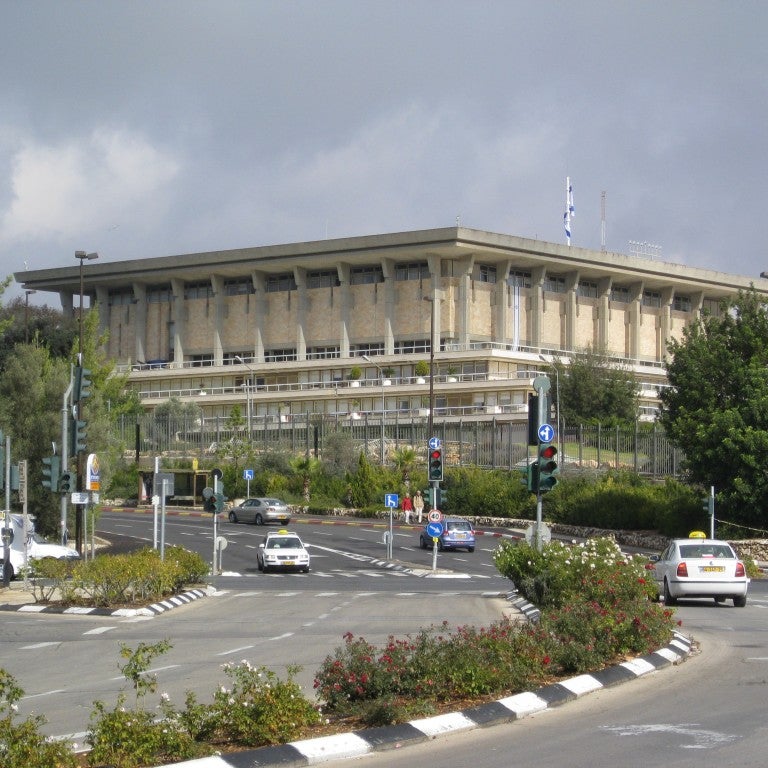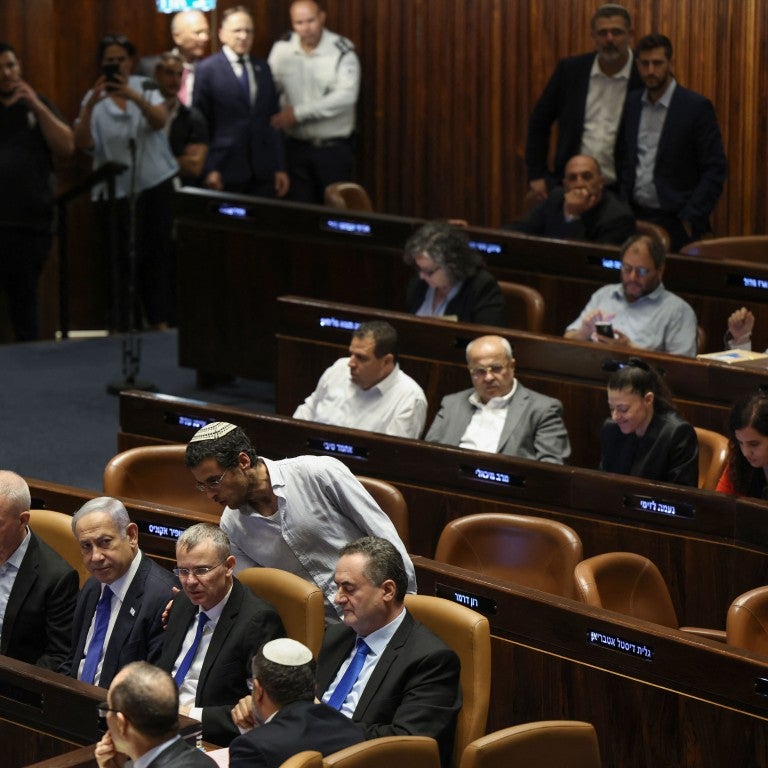June 13, 2023
Proposed judicial reforms in Israel that would dramatically shift the balance of power in the Israeli government have triggered mass protests, condemnation from wide swaths of Israeli society, and expressions of concern from American Jewish organizations. President Biden, too, has weighed in, stressing the importance – in both the United States and Israel – of an independent judiciary, and the need to reach “consensus” on “fundamental changes” in governance.
Over the last five months, hundreds of thousands of Israeli citizens, in a country of just over nine million, have taken to the streets of Tel Aviv and other major cities each weekend to protest the reforms and other aspects of the current government.
Here is a breakdown of the proposed judicial reforms and why Israelis are protesting.
What are the proposed changes to Israel’s judiciary?
Lawmakers from the ruling coalition have been pushing for changes that would limit the Supreme Court’s powers to rule against the legislative and executive branches, giving the Knesset the power to override Supreme Court decisions with a simple majority of 61 votes out of the 120-seat Knesset. Over the past 30 years, the Supreme Court’s power has grown and it has canceled 22 Knesset-created laws.
Another proposed reform would remove the Supreme Court’s authority to review the legality of Israel’s Basic Laws, which essentially function in place of a constitution. A third reform would give the governing coalition considerably more decisive powers in appointing judges.
Why do proponents find the proposed judicial reforms so necessary?
In the Israeli parliamentary system, the legislative and executive branches are institutionally aligned – meaning that the only real check on legislative overreach lies in the court, not in the executive branch.
Israel has an unusually empowered judiciary, with a High Court that has extremely broad jurisdiction. It can apply what some see as subjective and arbitrary “reasonableness” standards to evaluate legislation and easily strike it down. It’s also in some ways self-perpetuating – with the country’s legal establishment, rather than elected officials, controlling judicial appointments. The new Israeli government proposes to address the balance, or imbalance, of power. Some see this as increasing control of the legislative branch and weakening the courts, while others view it as restoring the balance that existed during roughly the first half of Israel’s existence.
Does Israel have a constitution that functions as the supreme law of the land?
Unlike the U.S., Israel does not have a constitution with built-in procedural hurdles for changing the country’s basic political and legal structures and protecting minority rights and civil liberties. Instead, the protection of minority rights and civil liberties is rooted in the principles outlined in Israel’s Declaration of Independence.
“We are encouraged by President Herzog’s proposal that acknowledges the special status of Israel’s Basic Laws and the need to prevent a simple majority of the Knesset from making changes that would jeopardize minority rights and civil liberties,” Ted Deutch, CEO of American Jewish Committee (AJC), said in a statement in late February.
Do these judicial reforms threaten Israel’s democracy?
The Israeli democratic spirit is alive and well, and the public is making its voice heard. The months-long, multi-step process to move this legislative package has had many points in which Knesset members could take into account what they are hearing from their constituents and a wide range of influential public figures, including President Herzog.
Without a bicameral legislature, or a written and difficult-to-amend constitution, or a wholly separate executive branch – all of which exist in the U.S. system – and without other restraints, among the options that could emerge is a majoritarian system – democracy without guardrails – in which the narrowest possible majority, perhaps in the heat of the moment, could upend minority rights and make other fundamental changes in the law by overturning a Supreme Court ruling. If the full package of reforms should pass, which is uncertain given the possibility of multi-party compromise in the negotiations conducted under the auspices of President Herzog, Israel will still be a democracy – but a democracy with fewer protections than exist now.
Whatever the Knesset does, Israel will continue to be the homeland of the Jewish people and a refuge for endangered Jews anywhere. It will still be a pluralistic, multi-ethnic, and multi-religious society. It will still be a source of pride for Jews everywhere. It will still contribute to regional and global peace and prosperity. It will still be America’s most capable and reliable ally in a volatile region. And because of its unquenchable democratic spirit, it will still be capable of further change – if the public so demands – at the ballot box.
Why did Israeli Prime Minister Benjamin Netanyahu announce the firing of Israeli Defense Minister Yoav Gallant?
On Sunday, March 26, Israeli Prime Minister Benjamin Netanyahu announced the firing of Israeli Defense Minister Yoav Gallant. This news came less than 24 hours after Gallant called for a pause in the government’s consideration of judicial reform legislation. He was the first member of the Israeli cabinet to do so, citing his concern for the security of Israel.
Following Gallant’s call for a pause, AJC released a statement in support: “AJC appreciates Defense Minister Gallant’s comments urging a pause to judicial reform legislation. We hope that the coalition and opposition will take the upcoming Passover break to commit to a deliberative process that reflects the broadest possible consensus. AJC continues to believe that any reforms should preserve checks and balances and respect minority rights and civil liberties.”
What happened after Prime Minister Netanyahu announced the firing of Defense Minister Gallant?
The announcement that Netanyahu was firing Gallant triggered widespread protests across Israel on Sunday evening March 26, with hundreds of thousands of demonstrators taking to the streets in several major cities. The demonstrations were the largest to that point in the period of protests about judicial reform.
In addition, a White House National Security spokesperson said, “We are deeply concerned by the ongoing developments in Israel, which further underscore the urgent need for compromise.”
Several entities in Israeli society, including the country’s largest labor union, also joined in a work strike to protest the government’s latest actions. The strike affected transportation, schools, and other public services, causing significant disruptions across the country the following day, Monday, March 27. Diplomats stationed at Israeli missions throughout the world also announced they would join the strikes. Counter-protesters in favor of the judicial reform also organized that Monday outside the Knesset.
What was Prime Minister Netanyahu’s reaction?
In a nationally televised speech on Monday evening March 27, Netanyahu announced that his government would pause considering the reforms, following mass protests across the country and labor strikes.
Calling for dialogue, Netanyahu said that he was aware of the mounting tensions in Israeli society and that he would be delaying the final reading of the judicial appointments bill until the next Knesset session scheduled to begin in May. However, he still vowed that judicial reforms will still pass in one form or another. The judicial reform legislation has not moved since the package was put on hold.
In response to the Prime Minister’s address, Israel’s largest labor union and local councils called off their strikes. However, organizers of the protest movement have said they plan to keep demonstrations going until judicial reform legislation is canceled entirely. President Isaac Herzog, announcing that he had spoken with Netanyahu as well as leaders in the opposition, Yair Lapid and Benny Gantz, urged them to start an immediate negotiation process under the auspices of the President’s Office to reach a broad agreement on judicial overhaul.
Reacting to Netanyahu’s announcement, AJC, alongside other American Jewish organizations, welcomed the “Israeli government’s suspension of legislation consideration of judicial reform measures. As a next step, we encourage all Knesset factions, coalition, and opposition alike, to use this time to build a consensus that includes the broad support of Israeli civil society. Israel’s political leaders must insist on a more respectful tone and debate." Read the full statement here.
What is AJC’s stance on judicial reform legislation?
Israeli President Isaac Herzog has urged lawmakers to create time for dialogue and compromise. In early February, Herzog outlined his own 5-point plan for compromise on judicial reform.
“We remain encouraged by President Herzog’s efforts to convene a dialogue and find compromise, and we hope that all parties will heed his call,” said AJC CEO Ted Deutch at the time.
“At the outset of this process, AJC expressed to Israeli leaders, to the Israeli public, and to our own leadership our strong belief that any changes to Israel’s judicial system should be the result of a deliberative, inclusive process that maintains checks and balances and respects minority rights and civil liberties,” said Deutch. “The legislation that has moved forward in the Knesset thus far, and the way in which it has been advanced, falls short both substantively and procedurally.” Click here to read Deutch’s full statement, released in late February.
AJC has shared with our friends in the Israeli government the risks it could face if it fails to maintain the critical reputation of its independent judiciary. Advocates have relied on that solid reputation over the years to beat back efforts to impose international judicial reviews of Israeli actions in the Palestinian territories or of Israeli actions in self-defense against terror.
Changes have been made in the past to the judicial-legislative balance of power. Further changes are not unreasonable – as AJC has said publicly and privately – as long as those changes are enacted in a consultative, inclusive, open, and careful process.
AJC has endorsed President Herzog’s call for a deliberative process. AJC also has supported the President’s call for the opposition to come to the table and be prepared to consider modifications to some aspects of judicial procedure, appointments, jurisdiction, and legislative override provisions.
In mid-March, following the release of a plan by Israeli President Isaac Herzog to resolve the issue of judicial reform, AJC commended the President for his remarkable efforts to reach a resolution for the good of the State of Israel.





